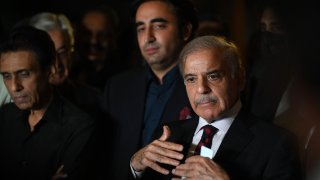
- In his first speech, Pakistan's new prime minister Shehbaz Sharif said he intended to refashion Pakistan as a "paradise" for investments, while also announcing an increase in the minimum wage.
- Sharif's path ahead is not easy, Iqbal Singh Sevea, the director of the Institute of South Asian Studies at the National University of Singapore, told CNBC.
- India, in particular, will be paying attention to the new administration.
- The key priority for the new government would be to fix ties with the United States, analysts said.
Pakistan has a new prime minister — and this could augur well for the South Asian country's return to a healthier economy and its relations with its traditional supporter, the U.S., as well as its rival, India.
On Monday, Pakistan's parliament picked Shehbaz Sharif as the country's new prime minister, just days after his predecessor Imran Khan was ousted in a no-confidence vote.
In what one observer called the "affirmation of democracy," the move was by no means inevitable in a country where no prime minister has served a full term in office.
Get top local stories in Southern California delivered to you every morning. >Sign up for NBC LA's News Headlines newsletter.
Surprising observers, the all-powerful Pakistan army, which has ruled the country for decades by staging coups, stayed in the barracks.
A decisive intervention by the judiciary was the next surprise. The Pakistan Supreme Court ruled that the government of Imran Khan had to face a no-confidence vote that it had tried to block. Khan eventually lost the re-scheduled trust vote in the early hours of Sunday and was removed from office.
What will Sharif do?
Money Report
In his first speech, the 70-year-old Sharif said he intended to refashion Pakistan as a "paradise" for investments, while also announcing an increase in the minimum wage.
Sharif's path ahead is not easy, Iqbal Singh Sevea, the director of the Institute of South Asian Studies at the National University of Singapore, told CNBC.
"He has inherited an economy rattled by a current account deficit and inflation. He will need to increase the state's capacity to accrue revenue through taxation and increase in investment, especially in the export sector," said the associate professor.
Pakistan is on its 23rd bailout from the IMF. The country's economy is under pressure from rising inflation, at over 10% this year, amid spiraling prices of crude oil and other commodities after the war in Ukraine.
"Under his watch, Pakistan is likely to negotiate another loan with the IMF and will need to commit to structural reforms and generate more tax revenue," Sevea said. "The task is all the more difficult given that he will need to do this without seeming to be cutting subsidies and going against welfare policies."
Sharif is a known figure internationally, according to James Schwemlein, a senior director at the Washington-based Albright Stonebridge Group, who pointed to his reputation as a capable administrator.
"Shehbaz Sharif ran Pakistan's largest province, Punjab. He did so largely developing a very positive effect with business. He was responsible for significant infrastructure investment. He's well known to all of the international interlocutors — whether they be American or Chinese," he said.
India: Improved relations?
India, in particular, will be paying attention to the new administration.
The way events unfolded in Pakistan is likely to provide an opening for New Delhi to improve relations with its neighbor, former Indian foreign secretary Shashank told CNBC.
Pakistan's "affirmation of democracy" would provide an "opening to move forward with bilateral relations," he said.
"But the test will be signals from the Sharif government and its all-powerful army," Shashank added. "The Pakistan army is desperately keen to build relations with the U.S.," he said.
U.S.: Repairing ties
The key priority for the new government would be to fix ties with Washington, analysts said.
Khan had used his oft-repeated allegation of a U.S. plot to oust him from power to block the no-confidence vote against his government. He claimed the U.S. was upset by a perception that Pakistan under him had moved closer to Russia and China.
Khan had departed from the traditional pro-U.S. establishment position to pursue a markedly different foreign policy, and embraced China's Belt and Road projects, Schwemlein told CNBC's Asia Squawk Box.
Calling his antagonism to the U.S. "dangerous" for Pakistan, he told CNBC on Monday: "The dream for Pakistan is that they can export to China. The reality for Pakistan is that they export to the U.S. and Europe."
Pakistan's economic fortune has been largely tied to maintaining positive relations with the West but Khan "acted against that," Schwemlein said.
It is likely that the new Sharif government will align itself more closely to the U.S.
China: Strategic ties
Pakistan had cultivated ties with both the U.S. and China as a way to overcome its security dilemma and maintain its balance of power with India, according to Shibani Mehta, a research analyst at Carnegie India.
"Because of its history with the U.S. and China, Pakistan needs them more than they need it," Mehta said. "The United States showed little appetite for embroiling itself in regional disputes. China's motivations are primarily anchored in a shared wariness toward and history of war with India; and commercial interests in Pakistan," she said.
"A change in Pakistan's relationship with either or both will depend on the strategic objectives of Washington and Beijing," she added.
But Sevea pointed out that no matter who comes to power, it was the army which would continue to have an important say in Pakistan's foreign policy.
"Given the concerns within the army over Imran Khan's criticisms of Pakistan's relations with the U.S. and the army chief's assertion of the importance of the relationship with the U.S., it is likely that Sharif will attempt to return to a balancing of the two," he said.






